NEW FRAME
The agony and anguish of Covid-19 burials
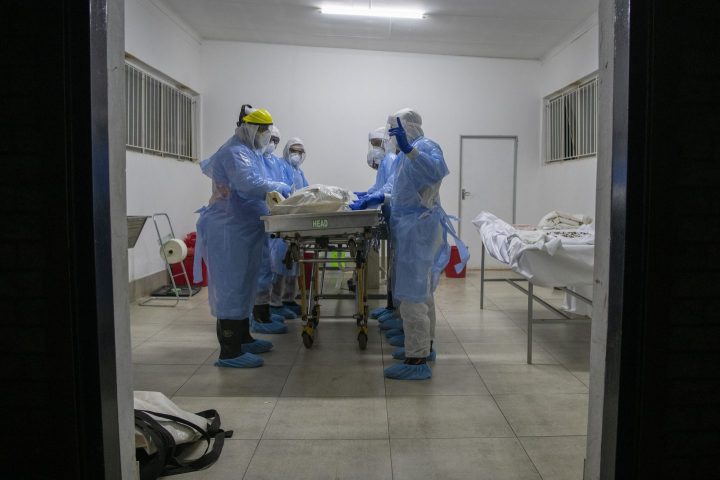
Gauteng has been in the eye of the coronavirus storm with almost 200 000 cases and almost 3 000 lives lost. New Frame traces the virus in a series of intimate portraits from the province.
This article was first published by New Frame.
It’s early on a Friday morning when the first message of the day arrives in the WhatsApp group. “Body for pickup at Bara morgue. Covid death. We need assistance with collecting the body and with burial at the cemetery,” it reads.
The WhatsApp group called “SC Covid Funeral” belongs to volunteers from the Saaberie Chishty Society, which provides ambulance, burial and welfare services to people in Lenasia and surrounding areas in Johannesburg. Within minutes of receiving the message, the society’s members spring into action.
“I’m available to pick up the body and drive the hearse,” comes a reply. “We need some people to assist with the ghusl [Islamic rite of washing and shrouding the body] and with burial,” reads another. “I’m available to help.” “I’m also available.” “I’ll meet you guys at the cemetery.” “On my way now.” The call for volunteers to help results in a stream of replies.
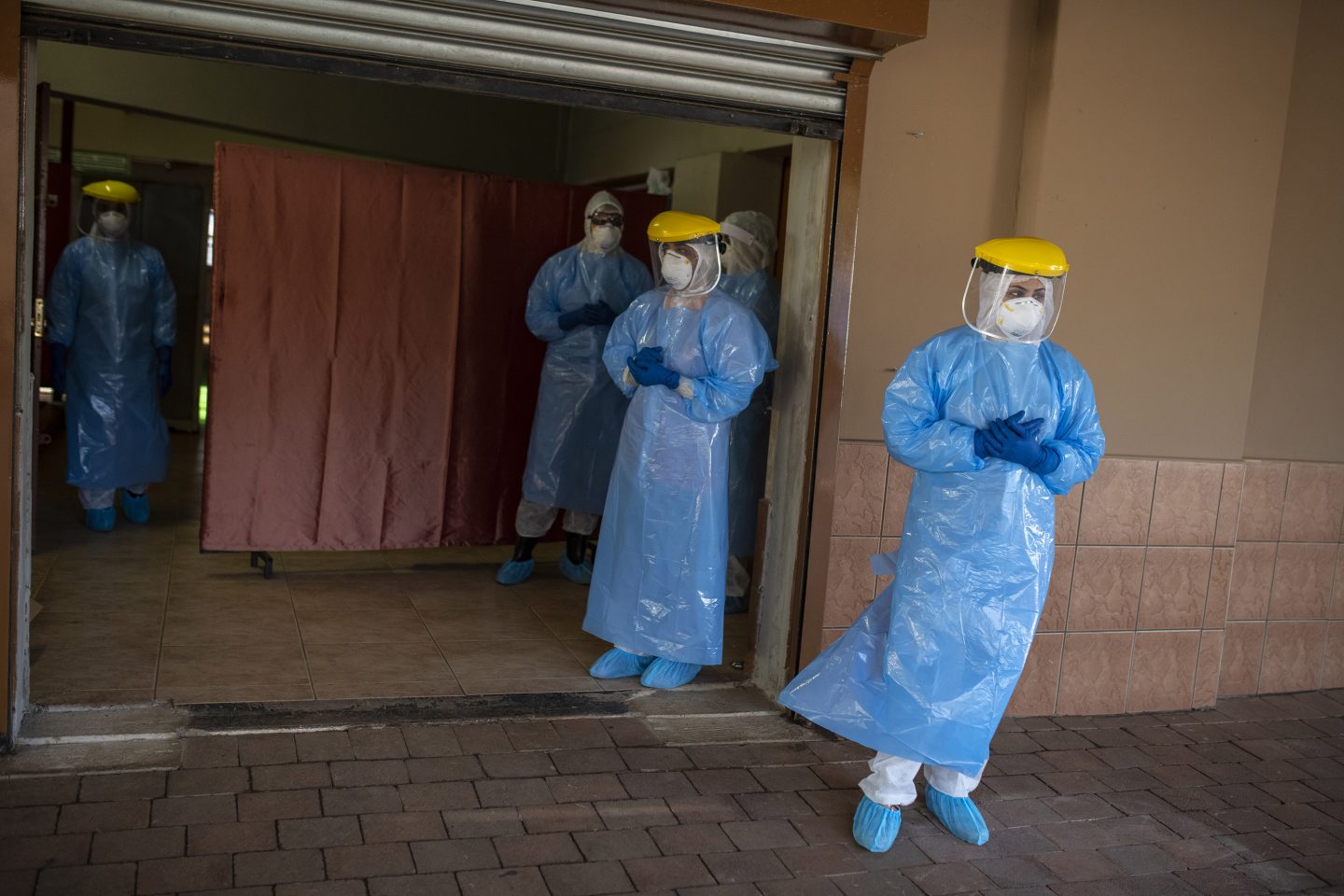
Women from the Saaberie Chishty burial society ready themselves to perform the ghusl on the body of a woman who died after contracting the coronavirus. 31 July 2020. (Photo: New Frame/Ihsaan Haffejee)
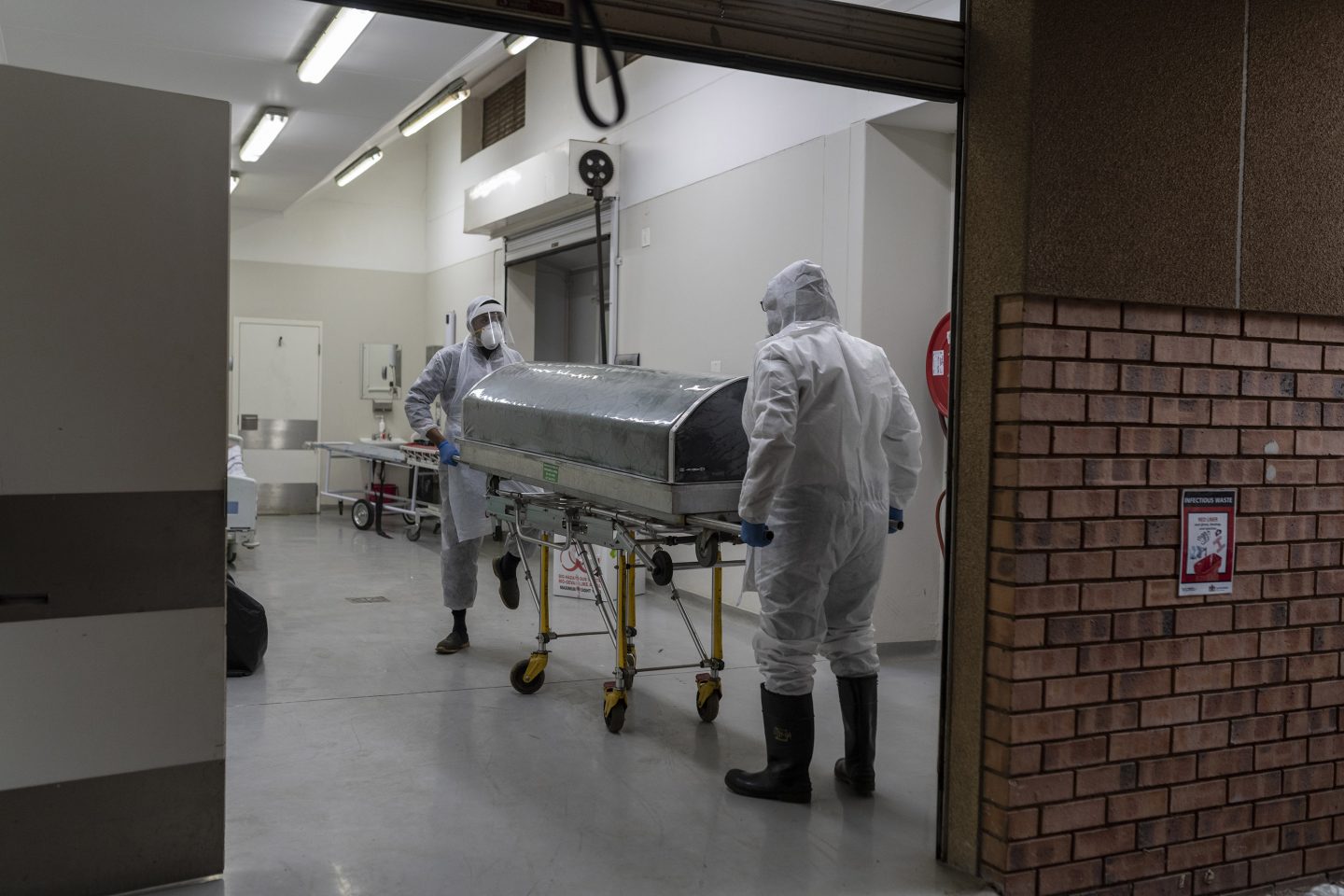
Saaberie Chishty volunteers pick up the body of a man who succumbed to the coronavirus from the Jabulani hospital morgue in Soweto. 31 July 2020. (Photo: New Frame/Ihsaan Haffejee)
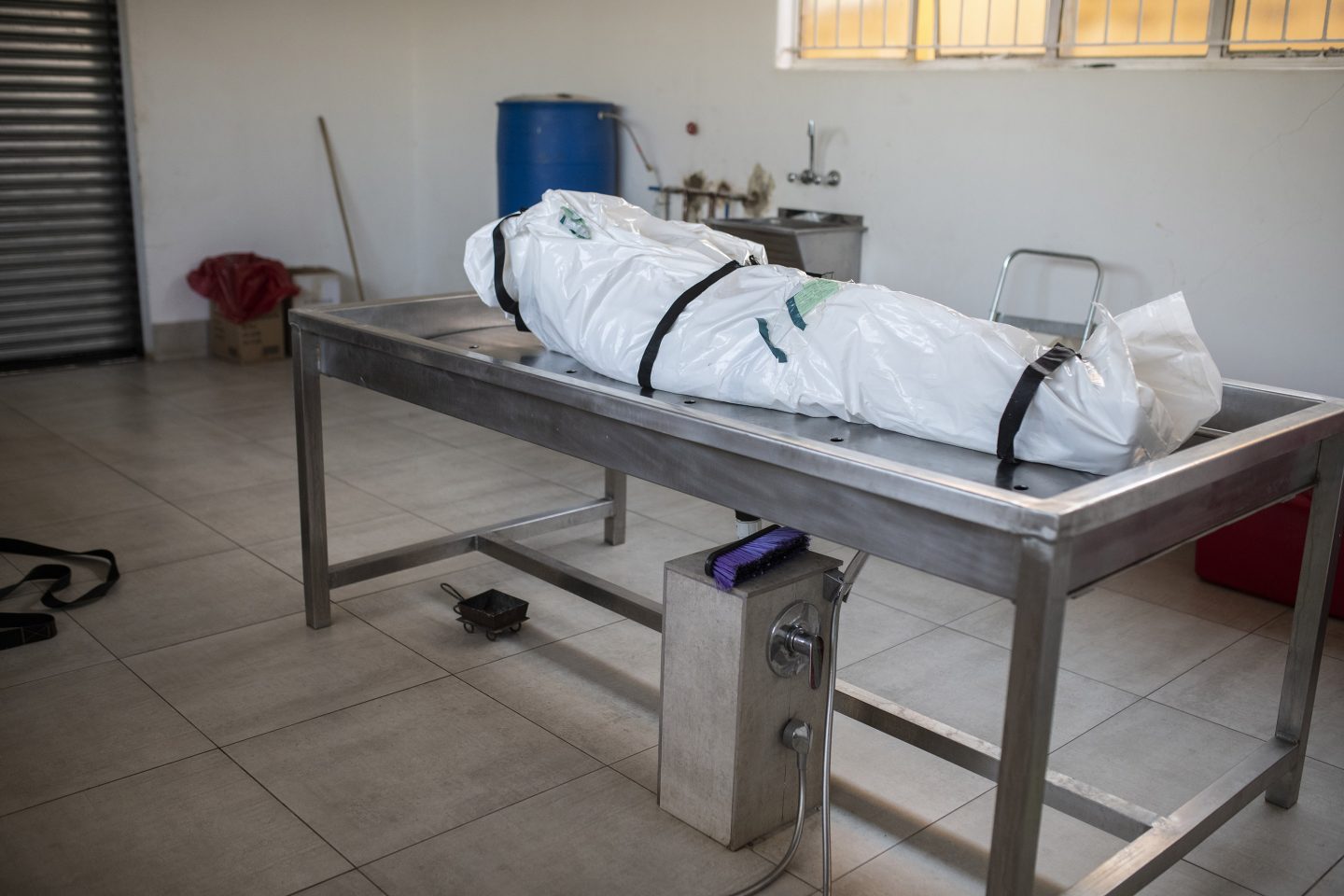
Wrapped in plastic, the body of a person who died from coronavirus waits on a metal table for the volunteer team to prepare it for burial at the Avalon Cemetery. 31 July 2020. (Photo: New Frame/Ihsaan Haffejee)
As the pandemic reaches its peak in Johannesburg, these types of exchanges have become increasingly frequent among the volunteers. Later that morning, the green hearse pulls into Avalon Cemetery, which is situated on the border between Lenasia and Soweto. At the back of the hearse is the body of yet another victim claimed by Covid-19. Painted on a window on the side of the hearse is a verse from the Qur’an. “Every soul shall taste death,” it says. In a world filled with uncertainty, manufactured facts and fake news, those five words remain one of life’s unquestionable and unvarnished truths.
The pandemic has pushed the spectre of death to the forefront of our lives. On television, radio and social media, we receive daily updates on the number of infected people, and the deaths. The numbers keep rising, the line graphs keep going up, the curve has not been flattened. Benjamin Franklin once said “in this world nothing can be said to be certain, except death and taxes”. Humans may have found ways to avoid paying taxes, but death is inescapable.
An act of love
The Saaberie Chishty organisation was established in the 1960s by long-time Lenasia resident Ally Sayed – or Sayed Ally, as his family refers to him, placing his surname first as a mark of respect – with the help of his sons and a few close family friends. Sayed and his family had grown up in Vrededorp, commonly referred to as Fietas, in Johannesburg. When the apartheid government instituted forced removals in the area, Sayed had to relocate his family to the then fledgling Indian township of Lenasia.
The family members had already established themselves as community activists in Fietas, and the tradition of service to the wider community continued in Lenasia. The Sayed home quickly became the place where residents of Lenasia would go whenever they needed help of any kind. Some came for food, others for clothing. No one was ever turned away, even though the family was not wealthy. A carpenter by trade, Sayed struggled financially, but he always put the needs of the impoverished around him first.
“My grandfather was not interested in accumulating the material possessions of this world,” said Riyaz Sayed. “His main interest was how to help his fellow human – how to be of service to the community.” Sayed was greatly inspired by Sufism, a mystic version of Islam aimed at bringing harmony between the material and spiritual as well as between men and society.
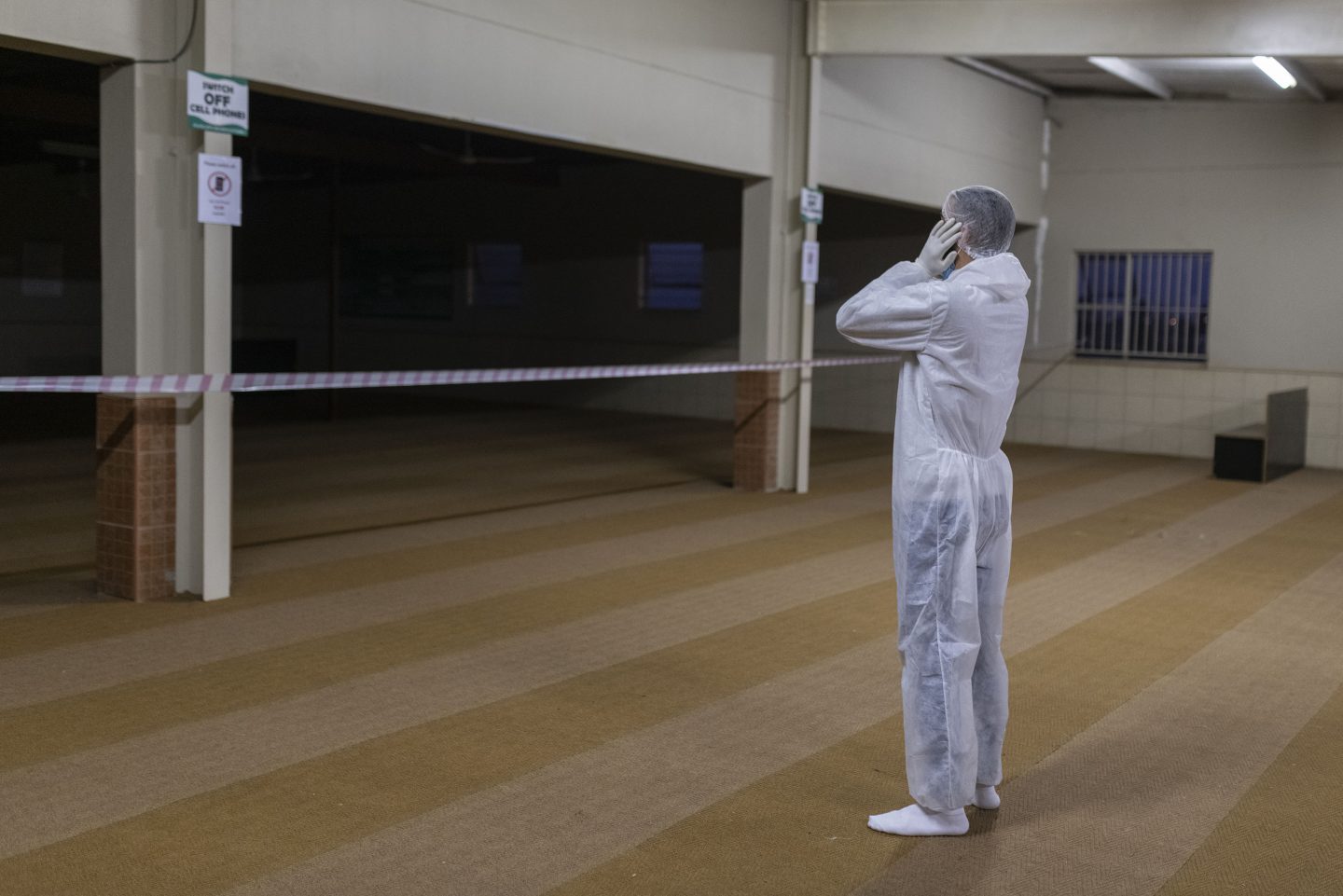
A volunteer from the Saaberie Chishty burial society takes a break for his evening prayers. 31 July 2020. (Photo: New Frame/Ihsaan Haffejee)
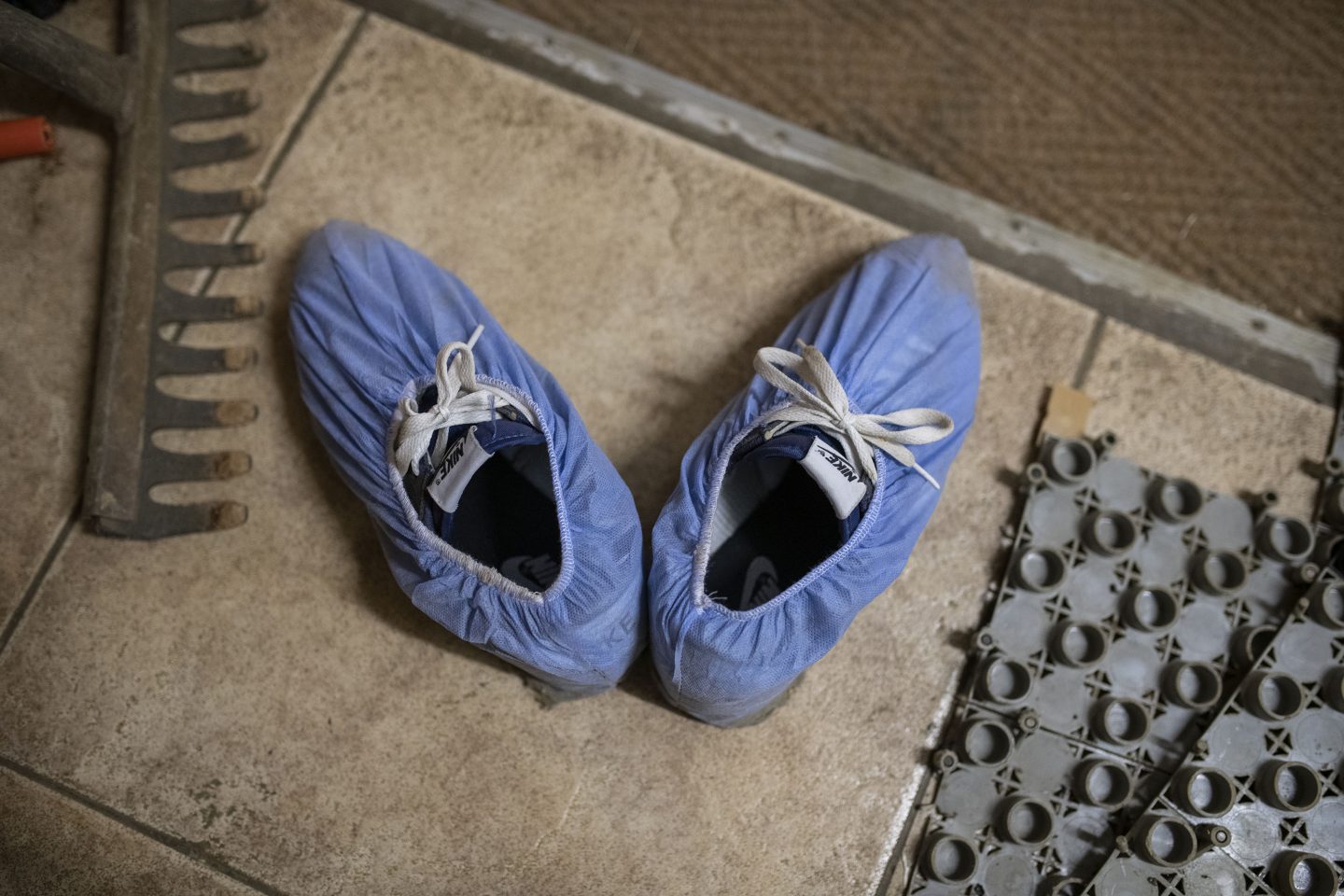
The shoes of a burial volunteer covered in personal protective equipment. 31 July 2020. (Photo: New Frame/Ihsaan Haffejee)
He passed this tradition of community service on to his sons and daughters, who went ahead and established a wide range of welfare programmes as well as burial and ambulance services. Like its ambulance counterpart, the burial service mainly assists the impoverished and destitute. Staying true to Sayed’s philosophy, the volunteers dedicate their time to ensure that even those who cannot afford the cost of a dignified burial can obtain one.
Sayed’s two eldest sons, Osman and Abbas, were always seen together. Whether at birthday parties, weddings, religious or social gatherings, Osman and Abbas were always sitting together and enjoying each other’s company. Osman served as the president of Saaberie Chishty while Abbas was its chairman. Abbas, in particular, embodied the values of community service preached by his late father.
“Uncle Abbas would never tell anyone he couldn’t help them. You could call him any time of the day or night and he would make a plan,” said Riyaz. “He dedicated himself fully to the service of others. If I have to describe him in one word it would be selfless.”
Shifting landscape
So, when it became apparent a few weeks into the pandemic in South Africa that Covid-19 would result in deaths that could require changes to the burial process, it was Abbas who urged his nephews and nieces to consult experts on the precautions needed to ensure the safety of both the volunteers and the families of the deceased. The burial service duly adapted to the continuously shifting landscape. Doctors and other specialists were invited to train the volunteers on using personal protective equipment (PPE) correctly, and strict guidelines and procedures with regard to sanitisation were instituted.
One of the main concerns relating to Muslim burials was the performance of the ghusl, the compulsory washing of the body by family members before burial. Exposure to the body of someone who has died of Covid-19 could mean contracting the disease. So it was decided that for these deaths the ghusl would only be conducted by the volunteers, fully covered in PPE, and not the families. Another procedure instituted was to transport the bodies of Covid-19 victims straight from the hospital or mortuary to the cemetery. In normal times, the families would first take the body home for final prayers. But times are far from normal these days.
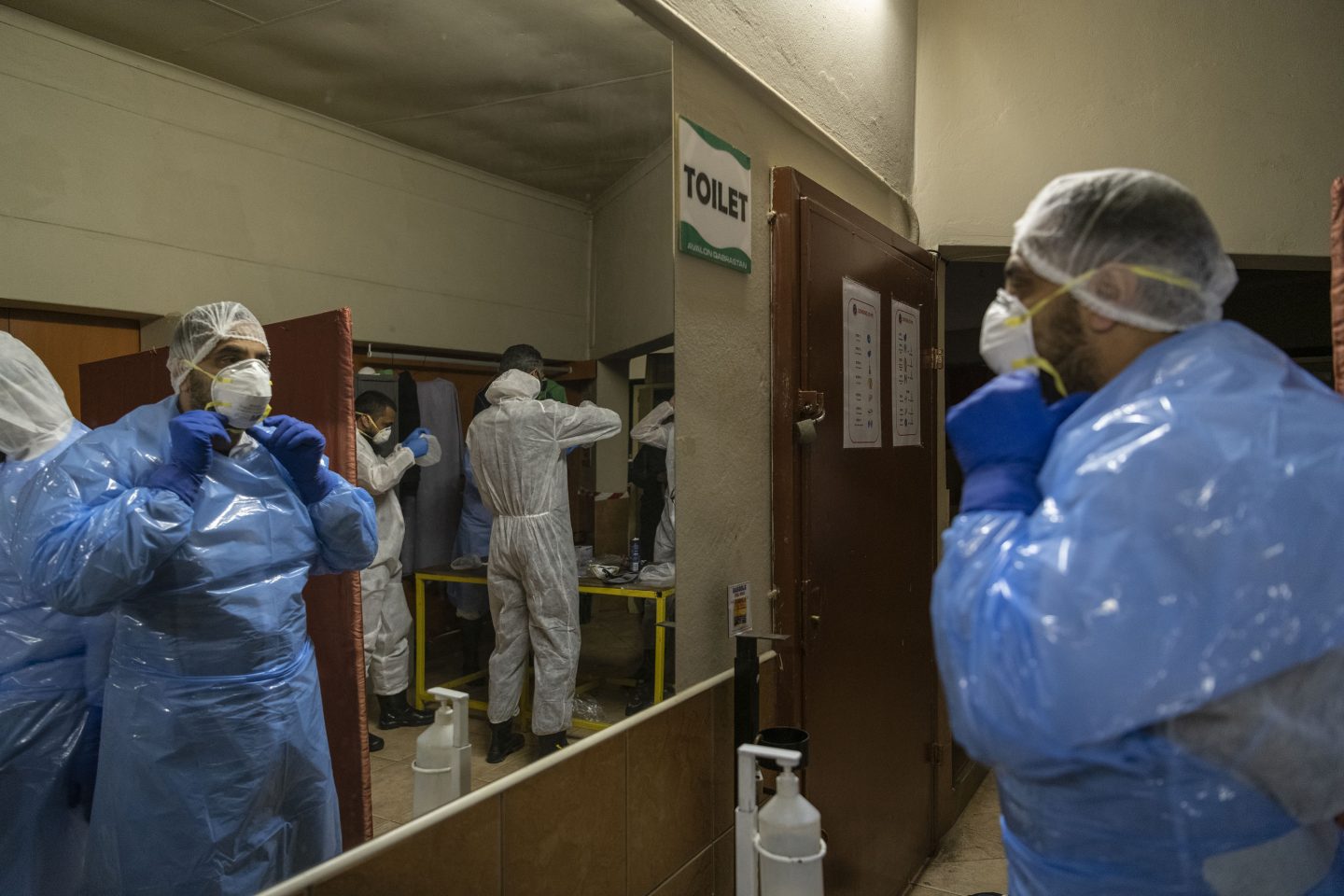
Saaberie Chishty volunteers don their personal protective equipment as they prepare for a burial. 31 July 2020. (Photo: New Frame/Ihsaan Haffejee)
Abbas was extremely happy that his family and the Saaberie Chishty volunteers had come together to plan and implement these procedures so that Muslim burials could be performed safely during the pandemic. The man described as a “gentle giant” was not to know that, in a few months’ time, these very same procedures would have to be implemented at his own funeral.
At first, a few members of the Sayed family started getting sick, although most of them recovered in due time. But when Osman, the eldest of the brothers, began experiencing breathing problems, he had to be admitted to hospital. A few days later, Abbas collapsed while busying himself with community work, and his oxygen levels began to drop. He was forced to join his brother in hospital, where their tests for the coronavirus came back positive. The brothers’ condition worsened, and after a week in hospital Abbas passed away. Less than 24 hours later, Osman was dead too.
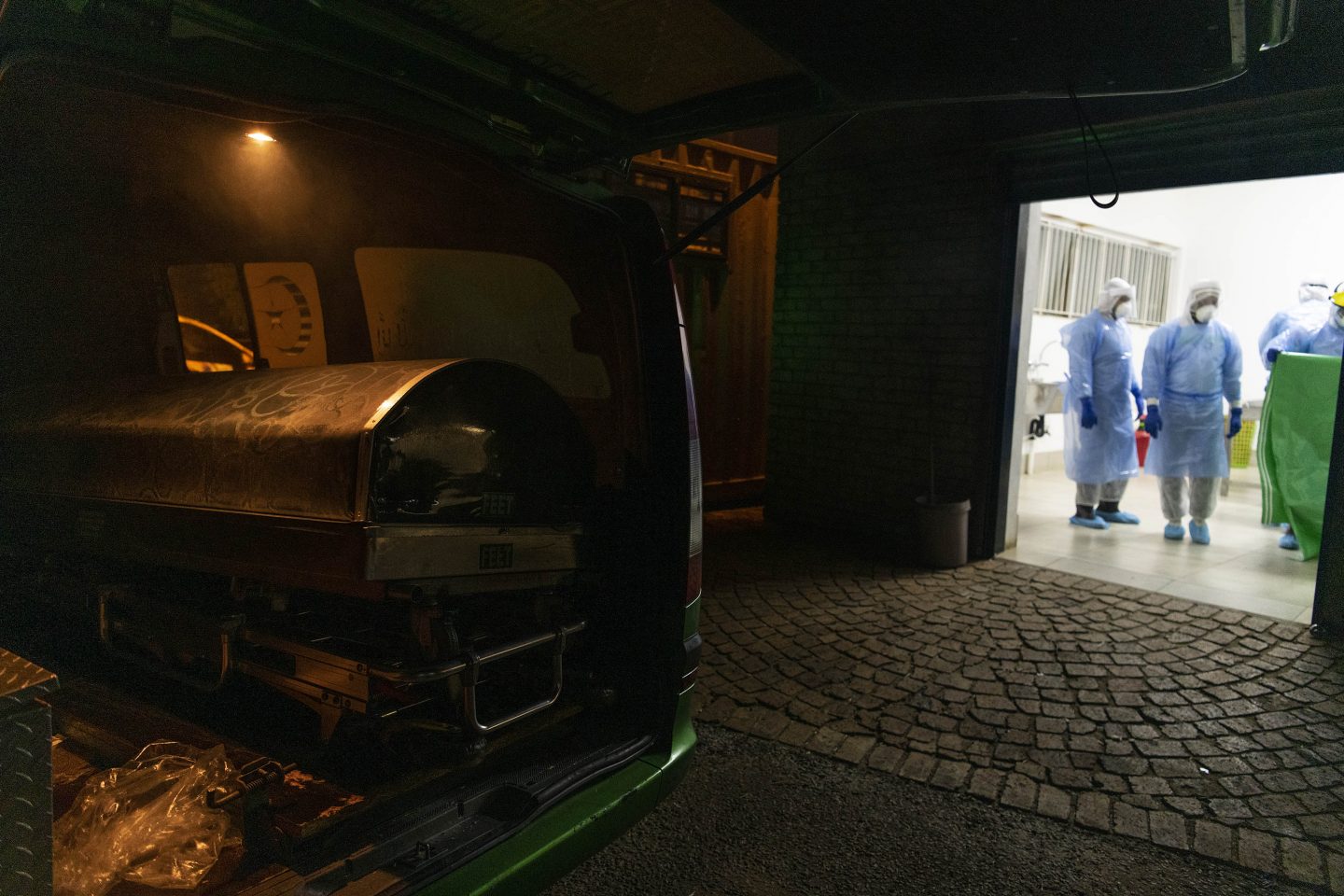
A casket carrying the body of a man who died from the coronavirus waits in a hearse while volunteers clad in personal protective equipment prepare to perform the ghusl. 31 July 2020. (Photo: New Frame/Ihsaan Haffejee)
In one fell swoop, these two giants were felled. It was like a hammer blow to their family, their organisation and their community, which they had served so selflessly for so many years. And so it came to be that the two brothers who could always be seen sitting together at functions and who truly enjoyed each other’s company are now buried next to each other at Avalon Cemetery, laid to rest by the same burial service they had helped establish.
“It’s been a difficult time for the family losing these two pioneers,” said Riyaz. “It was unexpected, but now it’s time for us as the younger generation to ensure that we embody their values and continue their work.”
Distance and sorrow
Back at Avalon Cemetery, the work continues. It is now late morning and the body brought in earlier by the hearse has just been buried. The grieving family has barely left the graveside when a convoy of cars signalling another funeral enters the cemetery. This time, the cause of death is not Covid-19, so the family gathers around the grave to lay 84-year-old Amina Josephs* to rest. Almost everyone from her immediate family is there, but someone special is missing.
Everyone knew that Shaheen Josephs* was Amina’s favourite grandchild. She practically raised him, and Shaheen loved his grandmother more than anyone in the world. She would have wanted Shaheen to be one of those who enters the grave to bury her. But Shaheen tested positive for Covid-19 a few days ago and, even though his symptoms are mild, the most he can do is watch from inside his car that he parked nearby. His eyes fill with tears as he watches from a distance while his beloved grandmother is laid to rest.
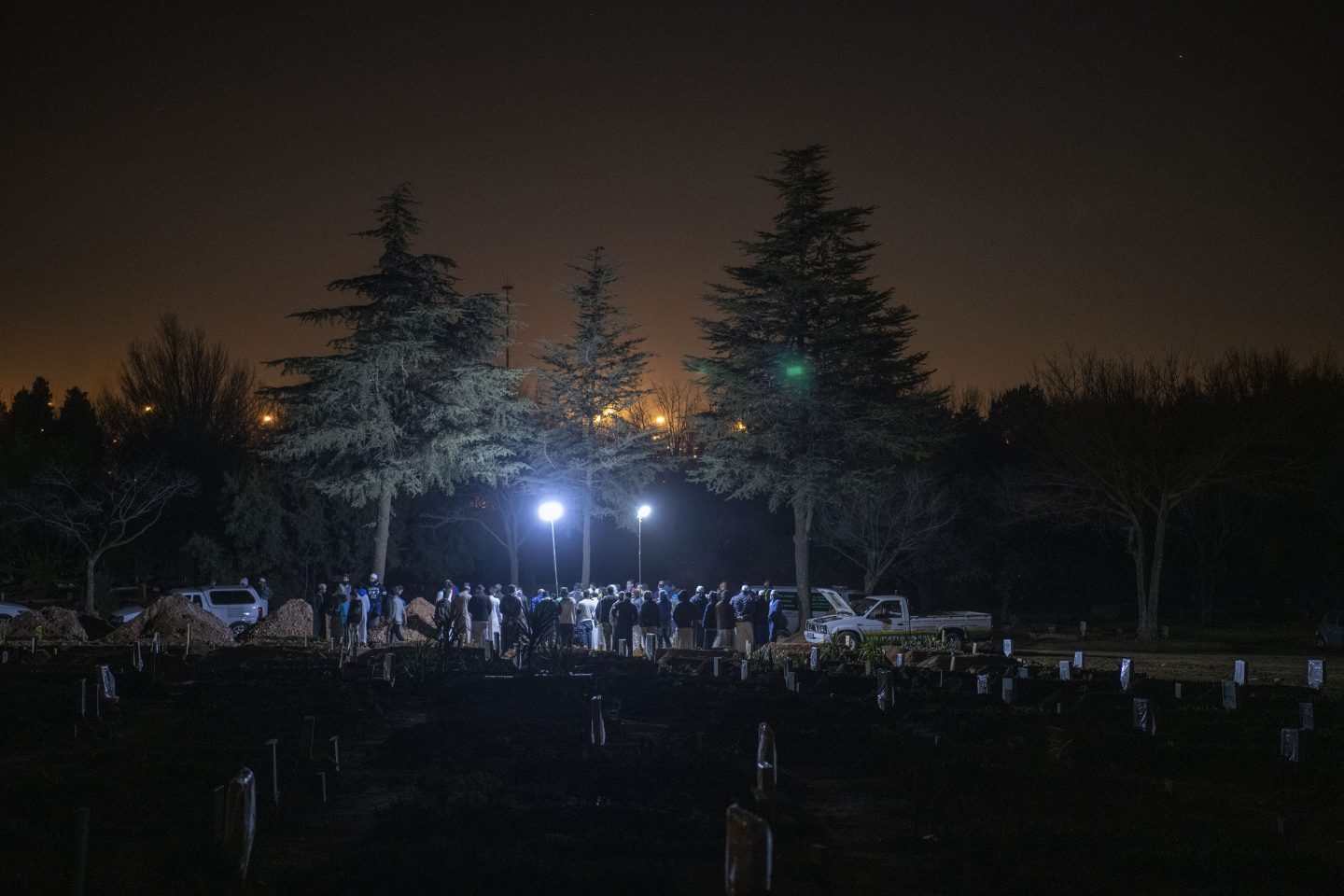
Mourners gather around a gravesite for a late-night funeral at the Avalon Cemetery. 31 July 2020. (Photo: New Frame/Ihsaan Haffejee)
After Josephs’ grave is covered, the final prayers are read and the family members depart. Shaheen exits his car, ghost-like in full-body protective gear, and makes his way to his grandmother’s freshly covered grave. He stands alone at the graveside and begins sobbing uncontrollably. In this moment of unimaginable grief and pain, Shaheen could use a hug and consoling from a loved one.
But no such embrace is forthcoming. The virus keeps his family away and he is left to grieve alone. His brother, watching from a distance, is desperate to offer some solace, but he is warned by a family member not to approach Shaheen as any contact could result in the virus spreading through the family. The virus was not the cause of this family’s sorrow, but its presence nevertheless refused to let them grieve peacefully.
Unending loss
By lunchtime, the burial service’s volunteers are busy once again. There has been another death related to Covid-19 and so another body is to be picked up from the Chris Hani Baragwanath Hospital mortuary. When the Saaberie Chishty hearse arrives at the cemetery with the body of 66-year-old Antjie Jardine, her nephew Faizel Jardine is sitting with a volunteer sorting out the paperwork required for burial.
Jardine is on friendly terms with some of the volunteers. He has got to know them well recently because Antjie will be the third family member he has buried in the past two weeks. The previous week, he buried his uncle Farouk, Antjie’s husband, and the week before that he buried his own father, Moegamat Ganief Jardine, who passed away after a heart attack.
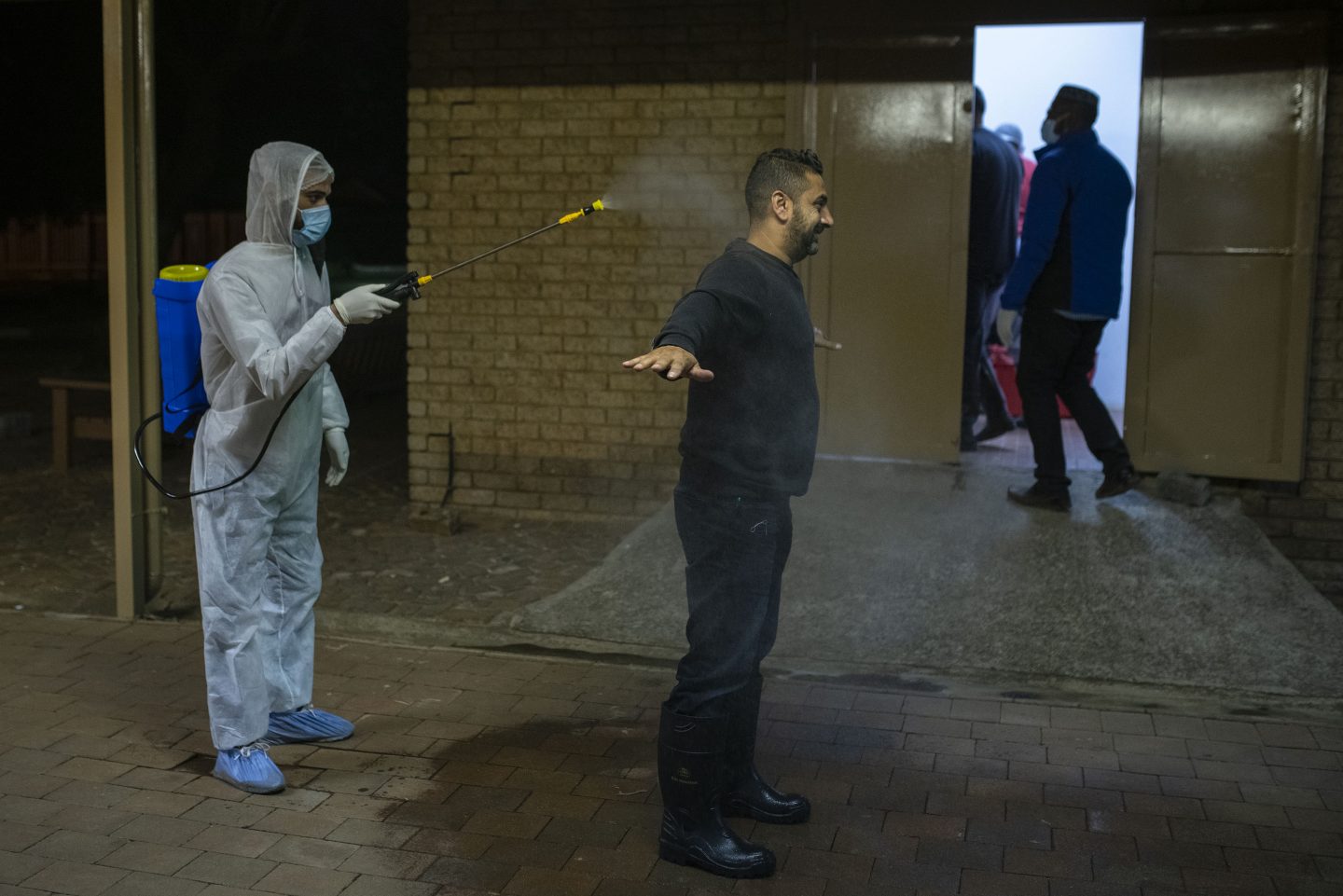
A Saaberie Chishty volunteer disinfects a colleague who has removed his personal protective equipment after leaving the room where the ghusl has been conducted. 31 July 2020. (Photo: New Frame/Ihsaan Haffejee)
By all accounts, Farouk and Antjie Jardine were still in good health. Both were still working and active in their community of Ennerdale. Farouk, a lifelong trade unionist, was involved in community activism in Ennerdale and the surrounding areas. He had been in the news recently as he was a member of the Ennerdale Stakeholders Association, which had taken the Gauteng Department of Human Settlements to court over brutal evictions in the south of Johannesburg. Antjie ran a daycare centre and was also involved in community activism.
It was in the second week of July that both Farouk and Antjie started feeling slightly ill, with flu-like symptoms. They were in good spirits and stayed home to rest and take their medication. Their condition worsened quickly, however, and by Sunday 12 July both husband and wife had to be taken to hospital by ambulance. Their breathing had deteriorated to such an extent that they had difficulty speaking. The following Monday, Farouk lost the battle against Covid-19 and a Saaberie Chishty hearse was on its way to fetch his body.
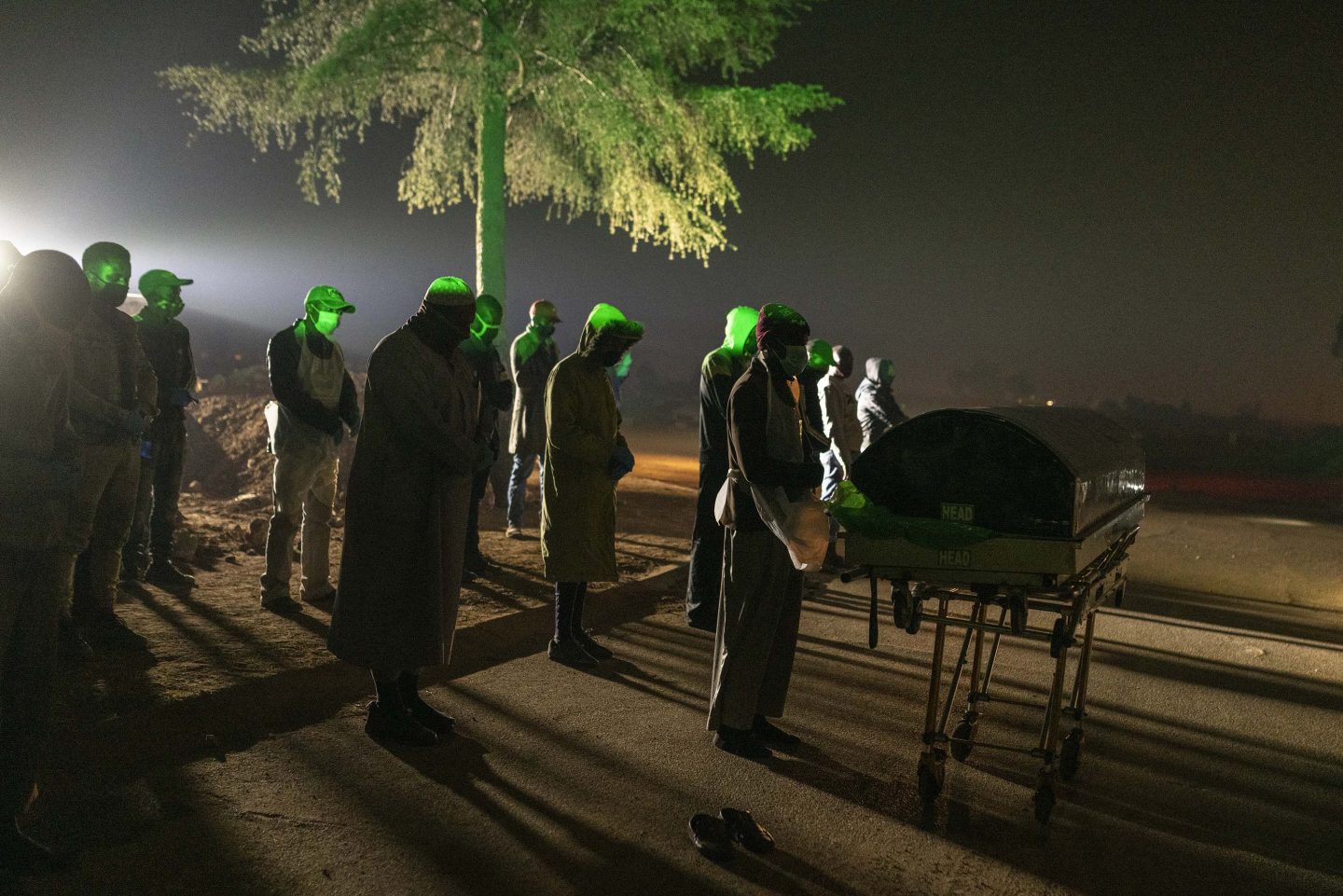
Final prayers are conducted for the deceased. Owing to Covid-19 restrictions, this prayer is now undertaken outside and while mourners would normally stand shoulder to shoulder in a show of unity, now they line up with physical distancing in mind. 31 July 2020. (Photo: New Frame/Ihsaan Haffejee)

The volunteer team helps with the last funeral at the end of a long day. The body of the deceased is lowered carefully into a grave at the Avalon Cemetery. 31 July 2020. (Photo: New Frame/Ihsaan Haffejee)
Farouk had lived in Ennerdale for decades and his work for the community was well known, so after his death the family requested that the hearse carrying his body go past his house instead of heading straight to the cemetery. Friends and neighbours lined the street to pay their last respects as it drove slowly through the neighbourhood.
Antjie was still in hospital and appeared to be faring better then her late husband, who she didn’t know had died. “My aunty was recovering,” said Jardine. “The doctors were looking to transfer her to a general ward. We as a family were waiting for her to get better so we could give her the news of her husband.”
But like her husband, Antjie’s body also succumbed to the virus, and so the members of the Jardine family found themselves back at Avalon Cemetery, the third time in two weeks.
It is now late afternoon. The sun is almost down and the dust on Antjie’s grave has not yet settled when another message hits the WhatsApp group. It reads: “Pickup required from Jabulani hospital. Assistance required for pickup and burial later tonight. Covid death.” DM
*Names have been changed at the request of the interviewee.



















 Become an Insider
Become an Insider